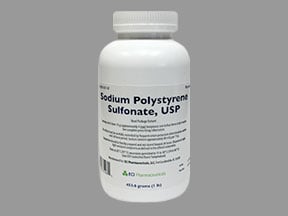
Sodium Polystyrene Sulfonate Coupons & Savings Card – Discount Prices from $4.41
Generic for: Sps (sodium polystyrene sulf)
My prescription
Edit
15GM, Sodium Polystyrene Sulfonate (1 Bottle)
Select pharmacy

CVS
$20.16
COUPON PRICE
Walmart
$4.41
COUPON PRICE
Albertsons
$5.99
COUPON PRICE
Walgreens
$6.53
COUPON PRICESodium Polystyrene Sulfonate savings card
Show this card to your pharmacist
Walmart
$4.41
BIN
ID
PCN
GRP
019876
LH78D1A772
CHIPPO
LHX
Powered by
More prescriptions for hyperkalemia
More prescriptions for hyperkalemia
Price history for Sps (sodium Polystyrene Sulf) (brand) & Sodium Polystyrene Sulfonate (generic)
1 Bottle, 15GM
Average retail price for Sps (sodium Polystyrene Sulf)
Average retail price for Sodium Polystyrene Sulfonate
Average SaveHealth price for Sodium Polystyrene Sulfonate
Our price history data is based on aggregated prescription data collected from participating pharmacies in America. Our prescription data updates daily to reflect the latest price changes. If you notice a missing data point, it means there wasn't sufficient data available to generate a monetary value for that date.
We analyzed Sodium Polystyrene Sulfonate prices for (15GM, 1 Bottle) over the last 12 months. The average retail price was $26.01, while the average price using the SaveHealth discount card was $8.92. That's a savings of approximately 65.71% when using our Sodium Polystyrene Sulfonate coupon.
Compared to the generic version, Sps (sodium Polystyrene Sulf) had an average price of $169.93 over the same time period. With the SaveHealth savings card, Sodium Polystyrene Sulfonate is 94.75% cheaper on average than Sps (sodium Polystyrene Sulf).
*Retail prices are based on pharmacy claims data, and may not be accurate when we don't have enough claims.
Sodium Polystyrene Sulfonate dosage forms
Dosage Quantity Price from Per unit 15GM 1 Bottle $4.41 $4.41 15GM 2 Bottles $6.32 $3.16 15GM 3 Bottles $8.23 $2.74
| Dosage | Quantity | Price from | Per unit |
|---|---|---|---|
| 15GM | 1 Bottle | $4.41 | $4.41 |
| 15GM | 2 Bottles | $6.32 | $3.16 |
| 15GM | 3 Bottles | $8.23 | $2.74 |
Sodium Polystyrene Sulfonate Warnings
When using this medication, it is crucial to be aware of the following safety information and warnings. Consult your healthcare provider if you have any questions or concerns regarding these details.
Serious Gastrointestinal Risks: Although uncommon, sodium polystyrene sulfonate (SPS) may cause severe stomach and intestinal issues, such as bowel or intestinal necrosis. This condition results from insufficient blood flow to the intestines and can be life-threatening. The risk increases when SPS is taken alongside sorbitol, a sweetener and laxative. Avoid sorbitol while using SPS. Ensure normal bowel movements before taking this medication. Contact your healthcare provider immediately if you experience blood in your stool, nausea, vomiting, constipation, diarrhea, fever, or abdominal pain, as these may necessitate discontinuing the medication. Individuals with a history of intestinal problems, low blood volume, kidney issues, or those who are pregnant or have undergone intestinal surgery should exercise caution.
Electrolyte Imbalance: Sodium polystyrene sulfonate (SPS) can lead to reduced levels of potassium, magnesium, and calcium. Your healthcare provider may monitor these electrolytes during treatment. Inform them of all medications you are taking and consult them before starting any new ones, particularly those that may also lower electrolyte levels, such as loop diuretics. If you experience vomiting, diarrhea, or a loss of appetite, contact your provider, as your dosage may need adjustment. Watch for symptoms like muscle cramps, numbness, nausea, weakness, shortness of breath, or confusion, and report these to your healthcare provider as they may indicate low electrolyte levels.
Swelling: This medication contains salt, which can lead to fluid retention and swelling in the arms, legs, or other body parts. While usually mild, this swelling can be hazardous for individuals with heart failure or kidney problems who need to limit salt intake. Notify your healthcare provider if you experience swelling, shortness of breath, require multiple pillows to sleep, or notice sudden weight gain.
Medication Timing: Sodium polystyrene sulfonate (SPS) may interfere with the absorption of other oral medications, reducing their effectiveness. Take other medications at least 3 hours before or after SPS. If you have slow digestion (gastroparesis), you may need to separate SPS and other medications by at least 6 hours.
Choking Hazard: There is a risk of choking if the SPS powder is inhaled. Mix the powder thoroughly in water and consume it while sitting upright to minimize this risk. This is particularly important for individuals with an impaired gag reflex or those prone to spitting up.
Contraindications: Do not use this medication if you have low potassium levels, a bowel obstruction, or if it is intended for newborns with gut movement issues. Always consult your healthcare provider before use if any of these conditions apply to you.
Sodium Polystyrene Sulfonate Side Effects
Common side effects:
- Loss of appetite
- Nausea
- Vomiting
- Constipation
- Diarrhea
Less common but important to monitor:
- Gut irritations
- Gut blockages
Serious side effects:
- Intestinal necrosis
- Low electrolyte levels
- Severe allergic reaction
Sodium Polystyrene Sulfonate Interactions
Interactions with high risk of serious adverse effects and should be avoided:
Interactions with moderate risk that may require dose adjustment, closer monitoring, or timing changes:
Interactions with low risk that usually do not require a change in therapy:
- Antacids/laxatives containing aluminum, calcium, or magnesium (e.g., aluminum carbonate, aluminum hydroxide, Calcium Carbonate, and Magnesium Hydroxide)
